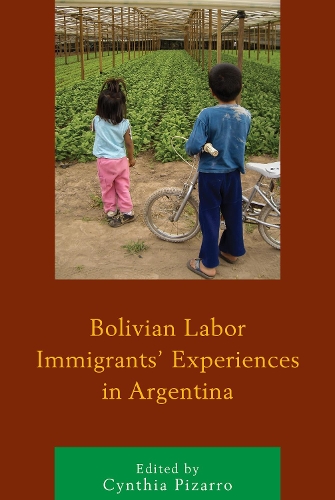
Bolivian Labor Immigrants' Experiences in Argentina
(Hardback)
Publishing Details
Bolivian Labor Immigrants' Experiences in Argentina
By (Author) Cynthia Pizarro
Contributions by Soraya Ataide
Contributions by Mara Lourdes Basualdo
Contributions by Roberto Benencia
Contributions by Ana Mara Ciarallo
Contributions by Mariana Ferreiro
Contributions by Mara Jos Magliano
Contributions by Ana Ins Mallimaci Barral
Contributions by Marta Silvia Moreno
Contributions by Cynthia Pizarro
Bloomsbury Publishing PLC
Lexington Books
3rd December 2015
United States
Classifications
Professional and Scholarly
Non Fiction
Migration, immigration and emigration
Ethnic studies / Ethnicity
History of the Americas
305.9069120984
Physical Properties
Hardback
168
Width 158mm, Height 238mm, Spine 18mm
390g
Description
Bolivian Labor Immigrants' Experiences in Argentina examines key issues regarding the structural factors that pattern the integration of Bolivian immigrants in labor markets segmented by inequalities based on class, gender, ethnicity/race, nationality, and migratory and legal status. The book provides ethnographic insights about the various ways in which Bolivian immigrants experience harsh living and working conditions in Argentina, demonstrating that these men and women are capable of dealing with oppressive situations and of performing particular ways of resistance. The book also refers to the trajectories of some Bolivians who had previously migrated to Spain and returned to Argentina after the European crisis in 2008. And it compares the south-south labor migration from Bolivia to Argentina with the north-north one from Tajikistan to the Russian Federation. The focus on labor migrants does not lead to a reductionist economic analysis of their trajectories, experiences, and prospects for the future. On the contrary, they are studied from a holistic anthropological approach, considering that migrants make sense of their territorial mobility from complex points of view anchored in their life experiences. Therefore, contributors consider that migration is a process that involves economic, social, cultural, and political dimensions.
Reviews
This timely collection on Bolivian labor migration to Argentina fills a void in migration studies. There is so little in English on labor migrations in the Southern Cone of South America or on South-South migrations more generally. While Peru, Bolivia and Paraguay have long sent migrants to Argentina, the Bolivian migration has been the longest lived and most persistent, a feature that this book traces in rural and urban Bolivian settlements in Argentina since the nineteenth century through many vivid ethnographic descriptions. The volume also provides an excellent account of the difficulties faced by Bolivian migrants crossing the border into Argentina, despite the ideal of free movement legislated by that state, and the barriers of social class, ethnicity and gender that continue to hamper their lives in the new country. While Bolivians are included in the labor market, they are excluded from welfare and other benefits of citizenship. Another gem this book offers is a comparative framework to other labor migrations: Bolivians in Spain, and Tajiks in Russia. -- Judith Noem Freidenberg, University of Maryland, College Park
Author Bio
Cynthia Pizarro is a professor at the University of Buenos Aires and researcher at the National Council of Scientific and Technological Research (CONICET).
